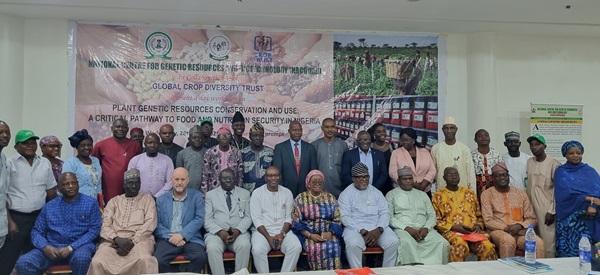
The permanent secretary of the Federal Ministry of Agriculture and Food Security (FMAFS), Dr. Marcus Ogunbiyi has reiterated that plant genetic resources (PGR) form the backbone of Nigeria’s food systems. He emphasised that their conservation and sustainable use are essential for ensuring food security, enhancing crop productivity, and improving the livelihoods of farmers across the country.
Ogunbiyi made this declaration at a one-day advocacy workshop on plant genetic resources conservation and use, held in Abuja.
Speaking at the event, he stressed that the future of Nigerian agriculture depends not just on inputs and markets, but more fundamentally on the genetic foundations of the crops cultivated nationwide. These genetic resources – comprising seeds, landraces, wild relatives and improved crop varieties – are indispensable raw materials for food production, crop improvement and adaptation to climate change.
He described PGR as playing a crucial role in maintaining crop diversity, enabling resilience in the face of environmental stressors and contributing to the nation’s economic growth.
“Plant genetic resources conservation and use lie at the very heart of sustainable agriculture, national food security, and long-term biodiversity stewardship. Biodiversity and plant genetic resources are central to both our agricultural heritage and our future,” he said.
Highlighting the threat of climate change, Ogunbiyi warned that biodiversity loss, genetic erosion and reduced crop productivity are imminent risks. Developing climate-resilient crop varieties, he noted, is one of the most effective adaptation strategies. He called for strengthened collaboration among stakeholders, broader awareness campaigns and targeted capacity-building to ensure effective PGR conservation.
He also emphasised the role of the National Gene Bank in conserving and providing access to plant genetic resources for research, breeding, and agricultural development. However, he acknowledged the major challenges Nigeria faces, particularly in terms of inadequate conservation systems and the rapid loss of plant biodiversity.
“These trends are deeply concerning. Each time a landrace or wild relative goes extinct, we lose a critical piece of our natural heritage and possibly a future solution to an agricultural crisis,” he added.
Ogunbiyi emphasised that conserving PGRs contributes to economic growth by enabling the development of new crop varieties, boosting yields, and enhancing overall productivity. He called on all sectors of society to support this cause.
“The conservation and use of plant genetic resources is not the responsibility of the government alone. It requires a whole-of-society approach. Researchers must continue to explore and improve local germplasm; farmers must be empowered to preserve traditional varieties; civil society must advocate for supportive policies; and the private sector must invest in seed systems that uphold genetic diversity,” he said.
“We must collectively move from advocacy to action, from policy to implementation, from silos to synergy. Let us ensure that our children inherit not only productive farms but also a wealth of genetic diversity to feed their future. I urge everyone to join hands in promoting sustainable PGR use to secure a resilient food system for Nigeria.”
Also speaking at the workshop, the permanent secretary of the Federal Ministry of Innovation, Science and Technology, Esuabana Nko-Asanye reinforced the importance of PGRs in promoting food security, crop resilience and sustainable agriculture. She noted that the National Centre for Genetic Resources and Biotechnology (NACGRAB) plays a pivotal role in conserving and making these resources available for research and agricultural development.
“It’s equally important to remind ourselves of our duty to protect these resources for future generations. They remain a source of hope and prosperity,” she said.
The director-general of the National Biotechnology Research and Development Agency (NBRDA), Prof. Abdullahi Mustapha, also addressed the gathering, underlining the significance of plant genetic resource conservation for food and nutrition security.
Represented by the director, agricultural biotechnology department at NBRDA, Dr. Rose Gidado, Mustapha described genetic diversity as a safeguard for ecosystem resilience, particularly in the face of climate change.
“Genetic diversity within plant species is vital for maintaining ecosystem stability. By conserving a broad genetic pool, we can develop crops that withstand pests, disease and environmental shifts, thereby ensuring a stable food supply and supporting economic growth,” he said.
In his remarks the Director of National Center for Genetic Resources and Biotechnology (NACGRAB), Dr. Anthony Okere, explained that the Seed for Resilience project, supported by the Global Crop Diversity Trust. According to him, the project has significantly strengthened NACGRAB’s capacity by providing advanced equipment and modernising its operations.
He noted that genetic resources conserved in the centre are now accessible to international researchers through a global online platform, promoting greater scientific collaboration. This development, he said, aligns with President Bola Tinubu’s initiative to address national food security challenges.
“The conservation and effective utilisation of plant genetic resources can enhance Nigeria’s ability to withstand climate-induced agricultural stress, improve food availability and bolster economic resilience,” Okere added.
The workshop concluded with renewed commitments from all stakeholders to work collaboratively to conserve Nigeria’s plant genetic heritage and leverage it for agricultural innovation, climate resilience and food security.

